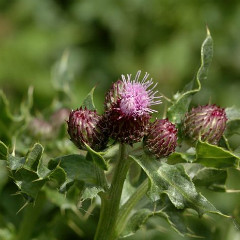
When I was a boy I spent a lot of time with my maternal grandfather. He was something of a recreational farmer, and we spent most of our days working in his gardens and fields. Once, while weeding a certain patch of something, he asked me if I knew what a weed was. I recall trying to fabricate an elaborate definition featuring thorns and thistles and the like.
“No,” he corrected (something I frequently forced him to do). “It’s any plant growing where you don’t want it.”
I thought about that statement while recently reading Gordon MacDonald’s book, Ordering Your Private World. Time and again MacDonald comes back to the idea of intentional cultivation as essential for keeping your life from going to pot. To set up this point, he quotes from Oscar Wilde’s fascinating prison letter, De Profundis: “I forgot that every little action of the common day makes or unmakes character. . . .” Disciplined living (preaching to myself here) is the only thing that keeps the weeds out. That’s true for the big actions and, as Wilde says, for the little ones too.
It’s important to note that weeds are not always bad or immoral things. Sometimes they are good and virtuous things that are merely growing where they do not belong. Every little action has the potential to become a weed. It takes constant cultivation to keep the plants growing in the beds where they belong. Otherwise work runs into family—runs into friends—runs into play—runs into prayer time—runs into sleep—runs into a tree.
Aimless busyness is a constant struggle for me and serves as a good example of what I’m driving at. Being busy can be good thing, but not when it’s growing out of place. If I fail to guard my calendar and intentionally manage my time, I become slave to other people’s agendas and am consumed by efforts that often fail to get me where I need to go. “I tend to invest my energies in unproductive tasks,” as MacDonald says. Wheels spin, calories burn, and I’m still no further along than when I started. Grandpa could tell me: Pluck the distractions, pull the unnecessary tasks, and uproot the time-wasters (especially the ones of which I’m most fond).
Cultivating discipline is the only way out of this tangle. MacDonald says that this is a basic question of stewardship and then offers a pretty sobering warning: Whatever is not cultivated is lost. The weeds choke it out. Think of that in light of your daily routine and behavior and then ponder all that you might eventually lose. I’m thinking of that now, and, without more weeding, the list grows long.
These considerations are only amplified when reflecting on our spiritual pursuits. Prayer time, meditation, Scripture reading—what MacDonald calls “soundproof[ing] the heart against the intruding noises of the public world in order to hear what God has to say”—easily get choked out by the weeds of daily life if they are not carefully and zealously protected. And these are not merely areas of average importance; they are the ones that give meaning to all the others. A garden growing thick with activities but no prayer is a patch of weeds.
There are few times better than the close of a busy week to contemplate the question: Whether they’re big thorny problems or ill-placed amusements, what are some of the weeds in your life?











